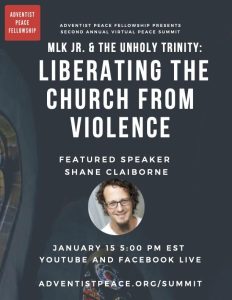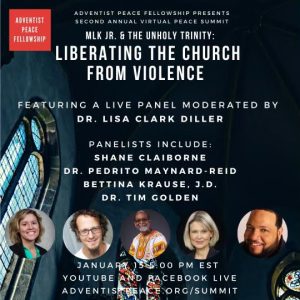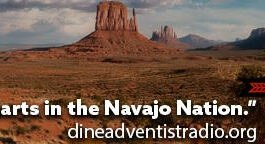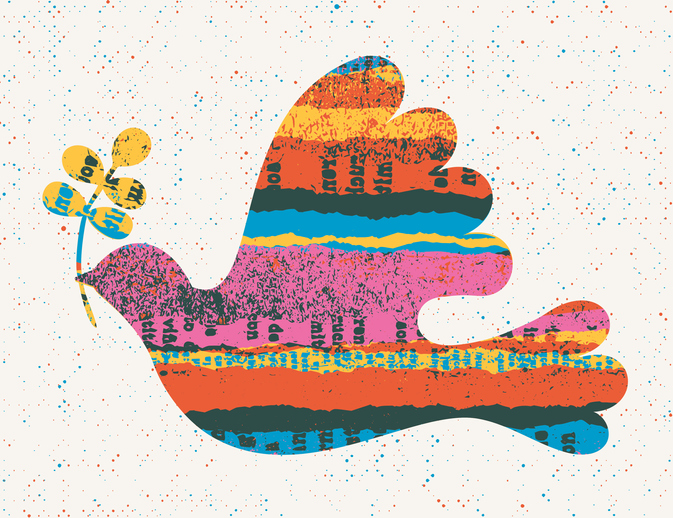When Martin Luther King, Jr. talked about American society’s big three evils, he ticked them off decisively and defiantly.
Racism. Militarism. Materialism.
This MLK weekend, Adventist Peace Fellowship (APF) spotlights, for its second annual online/virtual event, “Martin Luther King, Jr. and the Unholy Trinity: Liberating the Church from Violence.”
The event takes place Saturday, January 15, 5:00-6:30 p.m. ET / 2:00-3:30 p.m. PT, and Monday, January 17, 2022, 5:00-6:15 p.m. ET / 2:00-3:15 PT.
To join Saturday’s session, go to https://www.youtube.com/watch?v=csHyX4IDztI.
To join Monday’s session, pre-register at danielxisto@gmail.com.

Sabbath’s featured speaker is Shane Claiborne, world-renowned peace activist, speaker, and author of The New York Times best sellers The Irresistible Revolution and Beating Guns. His topic is “How Adventists Can Peacefully Undermine Weaponizing Racism.”
Shane founded The Simple Way in Philadelphia and heads up Red-Letter Christians, a movement of people who are committed to living “as if Jesus meant the things He said.” Shane’s work has appeared in Esquire, SPIN, Christianity Today, TIME, and The Wall Street Journal, and he has been on everything from FOX News and Al Jazeera to CNN and NPR. He’s given academic lectures at Harvard, Princeton, Liberty, Notre Dame, and Duke.
(Poster with Panel Participants Could Be Inserted Here)
A panel with diverse voices will then discuss how King’s call to resist racism and violence connects especially with our Adventist faith community. This year’s panel, with ample opportunity for attendee participation, will address root causes of violence, burgeoning U.S. gun culture, the militarization of law enforcement, protest violence, the Capitol insurrection, using Adventist Church official statements, and how to wage peace.
Panelists include Dr. Lisa Clark Diller (moderator), Co-Executive Director of APF and professor of History at Southern Adventist University; Shane Claiborne; Dr. Pedrito Maynard-Reid, Assistant to the President for Diversity and Inclusion and professor of Biblical Studies and Missiology at Walla Walla University; Bettina Krause, editor of Liberty magazine—a Seventh-day Adventist Church journal published since 1906 to promote freedom of religion or belief and separation of church and state—and former deputy secretary general of the International Religious Liberty Association; and Dr. Tim Golden, professor of Philosophy at Walla Walla University and founder of the Donald Blake Center for the Study of Race, Ethnicity, and Culture.
Alongside Nick Zork’s inspiring music, presentations of “When the Church Got It Wrong” and “When the Church Got It Right” will develop concepts that are clear-eyed and challenging.
Monday, January 17—Three Breakout Sessions (5:00-6:15 ET)
On MLK Day itself, participants may choose one of three breakout discussions. To join any of Monday’s breakout discussion groups, participants must pre-register at least 15 minutes before (by 4:45 ET / 1:45 PT) by emailing danielxisto@gmail.com

Discussion Group 1
“Adventists and Protesting: How Do We Stand Our Ground for Peace?”
Facilitators: Bettina Krause and Keisha McKenzie
Bettina Krause, J.D., was associate director of the General Conference Public Affairs and Religious Liberty department with responsibility for government affairs, representing the Adventist world church in Washington, D.C., engaging with Congress and the White House.
Dr. Keisha E. McKenzie (she/they) is Senior Vice President for Programs at Auburn Seminary, a multifaith center that catalyzes leaders of faith and moral courage, cultivates multiracial justice movements, and changes social narratives through research and mass action.
Discussion Group 2
“Adventists in the U. S. Military Today: A Discussion”
Facilitators: Kevin Burton and Bill Cork
Kevin Burton is Director of the Center for Adventist Research. He is currently pursuing a Ph.D. in American Religious History at Florida State University; his dissertation explores Adventist political involvement in the abolition movement.
William J. Cork, D.Min., is Assistant Director of Adventist Chaplaincy Ministries for the North American Division of Seventh-day Adventists. He served 20 years as a chaplain in the National Guard and Army Reserve.
Discussion Group 3
“Refugees and Immigrants: Ethical Adventist Perspectives”
Facilitators: Gabriela Profeta-Phillips and Moe Stiles
Gabriela Profeta-Phillips is Coordinator of Muslim Relations for the North American Division of Seventh-day Adventists.
Moe Stiles currently lives in Melbourne, Australia, serving as Chaplain for AdventCare in Victoria, whilst pursuing her postgraduate study, Master of Human Rights. Prior to this, Moe served as Lead Pastor in Vancouver, Washington.
Aims of APF
Adventist Peace Fellowship is devoted to inspiring and educating students and congregations in the work of bringing justice and peace to people in their communities.
APF started in reaction to the warmongering that occurred in the wake of 9/11 and the subsequent invasions of Afghanistan and Iraq. Under the leadership of Ron Osborn, the vision widened. “For the Healing of the Nations” became APF’s motto—encompassing all the justice and peace work to which we believe Jesus calls us. Under that motto, we identify six core commitments that flesh out that vision:
- Peacemaking and Reconciliation – a commitment to nonviolence and conscientious objection
- Care for Creation – a commitment to protect and restore all forms of life
- Sabbath Economics – a commitment to end poverty through economic justice
- Health and Human Rights – a commitment to bring affordable healthcare access to every human being
- Freedom of Conscience – a commitment to preserve liberty for all religious thought and practice, not just that of Christianity
- Racial and Gender Justice – a commitment to remove obstacles to radical human equality
APF Peace Churches have had their board approve a statement affirming the congregation’s intention to pursue biblical shalom as an integral part of the church’s mission, and wanting to be publicly identified as a Peace Church. In addition, Peace Churches have pledged to cultivate and enhance their peace-making efficacy—a journey of discipleship where we learn from one another. This process is laid out in detail on our website: http://www.adventistpeace.org/churches
What can people expect to experience during the two Peace Summit sessions?
On Saturday, they can expect to hear a bit from Dr. King himself, acknowledgment on where our church has failed, a prophetic word from author Shane Claiborne, short clips from various chapters and churches about how they are engaging in anti-violence actions, and a panel with diverse voices discussing how King’s call to resist violence connects with people in daily life.
On Monday, MLK Day, people can expect to participate in a vibrant, deepening discussion about matters that practically matter. We plan to model productive discourse, respectful listening, and surprisingly candid and refreshing communication.
What do you hope to accomplish with this Second Annual Peace Summit? What do you want those attending to take away from it?
We want people to leave knowing that racism and violence are not just plagues “in the world” but that they are deeply entrenched in the church. This is a reality we must acknowledge, repent of, and intentionally work toward liberating ourselves from. Jesus leaves no room for us to be silent or passive on this. We are called to be peacemakers, not merely peace lovers.
The Adventist Church has a long history of working for reconciliation, justice, and the Healing of the Nations. This history is nobly established in many official Seventh-day Adventist Church statements. Adventists young and old should know that they can pull on that tradition and the resources of the contemporary church to do the work of the Kingdom of God. Too often our members feel our church is so busy theologically navel-gazing that it forgets about the suffering planet and its hurting people.
“What does the LORD require of you but to do justice, to love kindness, and to walk humbly with your God?” (Micah 6:8, RSV). APF exists to create a space where fellow travelers can connect with the broader movement of Adventist justice work.









